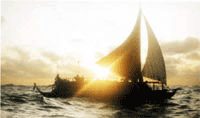

Início
Views from indigenous people about the Charter text, Aotearoa-New Zealand.
por Betsan MARTIN
Temas largos ligados:
Indigenous peoples .
| As a project for identifying responses to the Charter of Human responsibilities text, Betsan has carried out a series of interviews with a variety of socio-professional and cultural groups. This file is from interviews with Maori and Pacific Island groups. The contributors include traditional cultural guardians, leaders and researchers. All are speakers of their indigenous language, Samoan, Te Reo Maori and one a native speaker of Maori. The following is a synthesis of what was discussed, for which I take responsibility! |
Comments from the project
After careful reading of the principles, all said that the Charter reflects a western world view, and is referenced to its requirements and laws. What was being implied was that it addresses an adversarial system based on a dualistic worldview. The separation of nature and the environment, and culture are are codified in law. It forms the framework of religion and institutions and language.
Various comments were made on the different principles. For example, referring to ’Personal dignity includes contribution to the freedom and dignity of others’ addresses the individualism of western societies. A relational framework of indigenous people, and of Maori in particular, would see the wellbeing of self and others as interdependent and inseparable. Again in the principle ’For the flowering of the human personality, non-material aspirations and material needs must be addressed’, a separation between non-material and material was regarded as perpetuating such separation.
I was aware of a gesture by several of these contributors, of giving attention to the Charter text for a short time, and then quite soon setting it aside, almost discarding it, to reflect on associated concerns.
In New Zealand colonization has dispossessed Maori of land and of social organization that expresses a relational consciousness. Indigenous people have an ability to appreciate the founding nature of the country. Connectedness has been destroyed. The split between nature and culture has disabled Pakeha (later comers) from connectedness. That is the split which has to be healed. It is impossible to have respectful engagement with indigenous people if you cant understand that ’we are the natural world and it is us’.
Language was a primary focus, not surprisingly since this is a textual project. One person considered the document as secular and therefore not able to be interpreted into Maori concepts, which all connect with ’atua’ divine or sacred entities, gods. A translation of such a document into te reo Maori would subject the indigenous language to another form of colonization - leaving aside atua from a concept of responsibility would fracture the integrity of the culture and be unethical. The document looks like an order from afar.
Furthermore the different dialects in indigenous languages relate to the different tribal areas and environmental characteristics of that place. What dialect can be used for such a charter. Here are the issues of bringing together a universal notion with a unifying quality and the importance of safeguarding unique identity. There is also the challenge of grasping Maori concepts in English without destroying te reo Maori, Maori language.
In saying this, there was appreciation of the values inherent in the Charter document. Raising consciousness in individuals is necessary preparation for modes of governance to change. Democracy is based on the individual. Sustainability was seen to be integral with the principles.
How then is such a Charter to be transferred into the regions? For Aotearoa and Polynesia there needs to be a document that expresses kaitiakitanga, guardianship of land and resources, in which obligations that emanate from the deities are made explicit. In this traditional understanding of obligation to deities, no written laws are required. It is important to respect the position of tribal people. Obligations to life through a western god is an obligation to humanity, whereas for indigenous people, obligations through the gods are to the environment. The Charter does not express consciousness as Polynesians understand it; the notion of obligation is missing from the Charter.
Reflecting again on the text, it was said ’Maori cant promote it because of their powerless position’. Yet rich with characteristic complexity was an assertion of engagement with the force of Polynesian tradition and heritage, the necessity of Polynesian people upholding and evolving their values and ensuring they are brought to international life. ’The Charter is a basis for the waka, but articulation of it needs to be evolved’. Reference to the waka is to Pacific traditions of navigation.
People of the Pacific have Pole to Pole experience (North to South Poles), they live in the Pacific ocean, which is 1/3 of the earth’s surface, and the ability to work sustainably is established in the culture.


